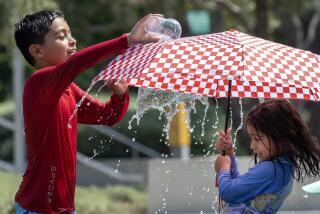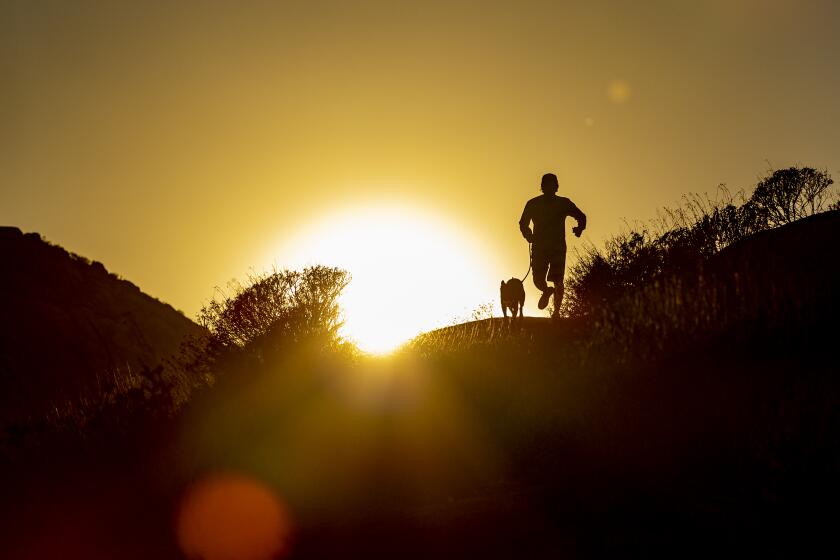It’s Swelter Weather
- Share via
Compared to the rest of the nation, Orange County has experienced a mild summer so far. But when the next heat wave does strike, health officials said, they expect many residents to place themselves at risk by refusing to change their behavior.
When the mercury climbs into the 90s and above, people run the risk of dehydration and even heat stroke if they don’t drink more fluids, reduce outdoor activities, wear lighter clothing and seek air-conditioned places to spend their time.
Still, many people--especially senior citizens--don’t heed these warnings.
“In the summer, I see some 80-year-olds coming in, wearing heavy sweaters. They don’t sense the heat well and tend habitually to dress heavier,” said Dr. Ronald Saltzman of San Clemente Hospital.
Health experts recommend wearing loose, lightweight clothing during extreme heat--as little as possible. Light colors are better than black, which absorbs heat.
Spending time in malls, movie theaters and other air-conditioned spaces can cool you down. Electric fans, however, may not prevent heat ailments, said Dr. Carol Rubin of the national Centers for Disease Control and Prevention.
“They can increase the comfort level, but circulating very hot air can actually increase the heat stress on your body,” she said. “People have been found [stricken] in closed rooms with the fan running.”
The CDC estimates that heat kills 381 people on average every year across the nation. Many recent deaths have been in the Midwest, but Orange County officials also are concerned.
“When it’s been extremely hot, like last summer, I really do worry,” said Betty Goyne, supervisor of the Westminster Senior Center. “The mobile homes are like ovens. The older homes are not well insulated, and they don’t have air-conditioning. Quite often, the seniors can’t afford it.”
Goyne said that some seniors refuse to use their electric fans, fearing higher electric bills.
The heat is especially dangerous for the elderly, as well as for young children, because their bodies do not regulate temperatures efficiently.
Some older people do not drink enough fluids either, and those who take medicine that diminishes sweating are even more at risk, Saltzman said. During hot weather, relatives should visit older family members to check on their well-being, he said.
Children, especially those younger than 4, retain more body heat than adults. Experts advise parents to dress their kids in loose clothes that allow the body to cool off.
And children’s outdoor activities should be minimized during the hottest hours, said Dr. Mark Langdorf, director of emergency medicine at UC Irvine.
Heat-related illness is broken into three categories:
* Heat stress is the mildest, but it can be a sign of a more serious condition, producing such symptoms as confusion and cramps.
* Heat exhaustion is more advanced. It is often the result of excessive loss of water and salt from the body, and the symptoms are heavy sweating, paleness, muscle cramps, fatigue, dizziness, headache, nausea, vomiting and fainting.
* Heat stroke can cause death or permanent disability. It is a result of the body’s inability to control its temperature, and symptoms include extremely high body temperature, red, hot and dry skin, rapid pulse, headache, dizziness, nausea, confusion and unconsciousness.
“If someone gets the symptoms of heat-induced illness, they should get medical attention because it’s a serious illness, and people can die of it,” Saltzman said.
For information and tips, see the CDC’s Web site: https://www.cdc.gov.
(BEGIN TEXT OF INFOBOX / INFOGRAPHIC)
Heat Hazards
Extreme heat can cause serious illness, and can be particularly dangerous to the elderly and small children. Here are the major heat-related illnesses, how to treat them and some tips for preventing them.
HEAT STRESS
Heat stress is often the first sign of more serious heat illnesses.
Symptoms: confusion and cramps.
Treatment: Rest in cool area, drink cold fluids, massage cramped area.
HEAT EXHAUSTION
Heat exhaustion can lead to heat strokes, and is the result of excessive loss of water and salt from the body.
Symptoms: heavy sweating, paleness, muscle cramps, tiredness, weakness, dizziness, headache, nausea or vomiting, and fainting.
Treatment: Same as for heat stress, and should not be allowed to progress to heatstroke.
HEATSTROKE
Heat strokes can cause death or permanent disability, and is a result of the body’s inability to control its temperature.
Symptoms: extremely high body temperature, red, hot and dry skin, rapid pulse, headache, dizziness, nausea, confusion and unconsciousness.
Treatment: Cool body with ice packs on wrists, ankles, armpits, neck; drink 4 ounces of water every 15 minutes. If a victim refuses water, vomits or is unconscious, seek immediate medical attention.
Treatment:
Get the victim out of the heat and provide water. Loosen the victim’s clothing and seek medical help.
Tips:
- Drink lots of fluids but avoid very cold drinks because they can cause stomach cramps. Also avoid caffeine and alcohol because they will cause a fluid loss instead.
- Wear loose fitting, light-colored clothes, preferably of natural materials like cotton.
- Stay in an air-conditioned area. If you do not have an air conditioner, go to a shopping mall or public library for a few hours. During heat waves, electric fans are not effective anough.
- Exercise early or later in the day when it’s cooler, and drink 2 to 4 glasses of water during each hour when exercising.
- Replace salt and minerals, sweating removes them from the body. Drink fruit juice or sports drinks to replace them. Do not take salt tablets unless directed by your doctor.
- Take baths or showers to cool off
- Pace your self. If your heart starts pounding, you loose breath, or become lightheaded and confused, stop and rest in the shade.
- Wear sunscreen because sunburn can affect the body’s ability to cool itself. Check the sun protection factor (SPF) number on the label and use SPF 15 or higher.
- Plan to do outdoor activities before noon or in the evening. When outside, rest frequently in a shady area.
- Avoid hot foods and heavy meals. - Do not leave infants or pets in parked cars.
- Check at least twice daily on family and friends who are 65 years or older. Sources: The American Medical Association Encyclopedia of Medicine, World Book, Times reports
More to Read
Sign up for Essential California
The most important California stories and recommendations in your inbox every morning.
You may occasionally receive promotional content from the Los Angeles Times.













